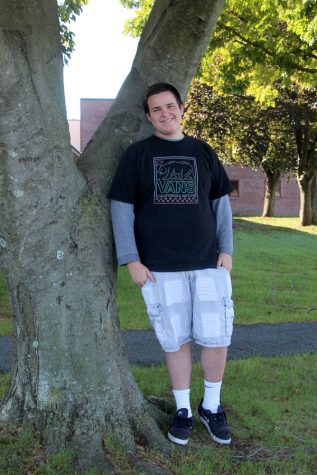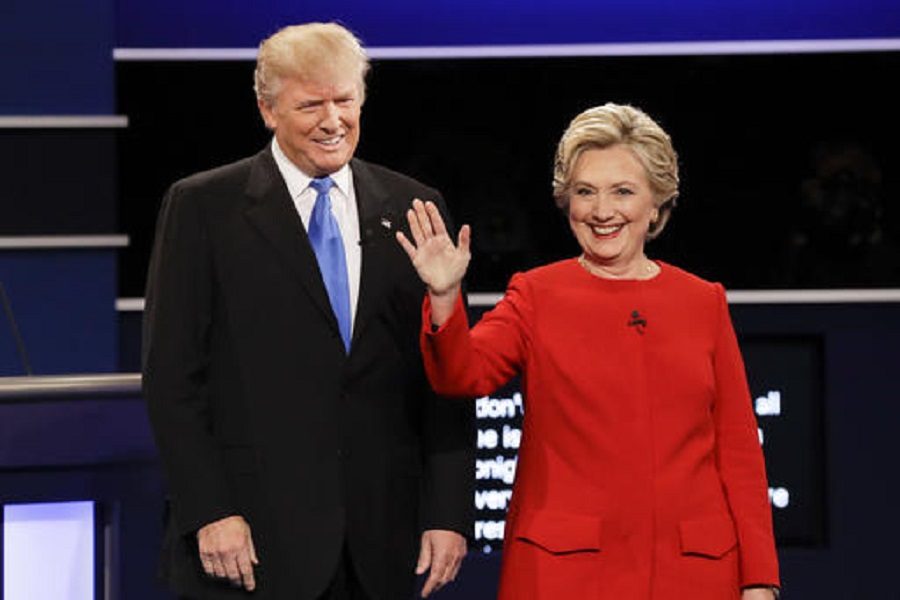Not-So Presidential Debate (Editorial)
Republican presidential nominee Donald Trump and Democratic presidential nominee Hillary Clinton are introduced during the presidential debate at Hofstra University in Hempstead, N.Y., Monday, Sept. 26, 2016. (AP Photo/David Goldman)
Have you ever held your tongue when someone starts talking about the presidential election?
In this age of being able to post any thought we have online, it’s more than likely that one will be chastised for a political belief, or any belief that they have had for that matter.
Decision 2016 has been especially ruthless due to the nature of the candidates. There was a debate on the 26th of September and it was a big one; I would even consider it iconic for this year’s election.
In fact, “Well over 80 million people tuned in to see Hillary Clinton and Donald Trump face off, setting a new record in the sixty year history of televised presidential debates,” says Brian Stelter at CNNMoney.
All social media was buzzing with opinions and jokes about what was said. The next day however, there weren’t many discussions about the debate; maybe poking fun about the digs the candidates made towards each other but not much of anything else.
If there was a discussion, it was mostly one sided and came down to someone close by scoffing or rolling their eyes, but not wanting to get into it.
Critical Issues classes and Civics reportedly watched part of the debate in class as an assignment. Students filled out notes on how to get the most out of a political debate. Then also made a formal chart describing each candidates positions on certain issues and attributes. It was primarily about setting your personal opinions aside and looking at each candidate without biased eyes.
This is great lesson for students to understand, separating opinions and factual information is crucial in making informed decisions for elections. Teachers went as far as deleting opinions from the final product before giving it back to the students. There should be more assignments like this in a school setting.
That being said, it is very difficult to look at something like the president objectively; at least students are being taught to respect the way someone else thinks and to remove personal thoughts from the facts.
It may be argued that these things should be taught at home; however not every child has a positive role model in the home. Every student should feel like they have a space safe enough to talk about these important issues. After all, they affect us, the next generation, the most going forward.
There are three things that you were either told not to talk about in a new social setting or that you had to learn the hard way – religion, politics, and money. This is because people will most likely get angered and start to think less of the person they are talking to because of the things they believe.
If we are taught to remove ourselves a little bit and make the debates less personal and more about the facts, it would limit the feeling of being attacked during the discussion.
I am not saying there shouldn’t be disagreements and debate on both sides of these issues;, I actually think that debate could help students see something from someone else’s point of view. However, the debate should be respectful and bias should be put aside.
Maybe, if we do this, we can scratch “politics” off of the list of things three things to avoid.
Disclaimer: Articles designated as “Editorial” represent the views and opinions of the author, not the 2016-2017 Periscope staff, CHS Administration, or the CHS student body.
Want to help the Herd? Please consider supporting the Periscope program. Your donation will support the student journalists of CHS and allow us to purchase equipment, send students to workshops/camps, and cover our annual website hosting costs.

Griffin O'Hagan is currently a senior at Carlisle High School and this is his first year on staff. He writes for the A&E section on the website but...




























































































